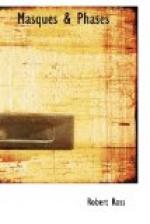’One day a curious change came over him. It was Monday when he and I were in the office receiving our instructions. Curtis, after going over some books, handed to Quentin a vellum-covered volume of poems, saying with a grim smile: “There are some more laurels for you to hash.”
’An expression of pain spread over Quentin’s serene features.
’"I’ll see what I can do,” he said wearily. But his curious manner struck both Curtis and myself. The book was a collection of very indifferent verse which already enjoyed a wide popularity. I cannot tell you the title, for that is a secret not my own. It was early work of one of our most esteemed poets who for some time was regarded by his friends as the natural successor to Mr. Alfred Austin. The “Acropolis” had not spoken. We were sometimes behindhand in our reviews. The public waited to learn if the new poet was really worth anything. You may imagine the general surprise when a week afterwards there appeared a flamingly favourable review of the poems. It made a perfect sensation and was quoted largely. The public became quite conceited with its foresight. The reputation of the poet was assured. “Snarley-ow must be dead,” some one remarked in my hearing at the club, and members tried to pump me. One day a telegram came from Curtis asking me to go down to his house at once. A request from him was a command. I found him in a state of some excitement, his manner a little artificial. “My dear Rivers, I suppose you think me mad. The geese have got into the Capitol at last.” Without correcting his classical allusion, I said: “Where is Burrage?” “He is coming here presently. Of course, I glanced at the thing in proof, and thought it a splendid joke, but reading it this morning, I have come to the conclusion that something is wrong with Burrage. You remember his agitated manner the other day?” I was about to reply, when Burrage was announced. His haggard and pale appearance startled both of us. “My dear Burrage,




